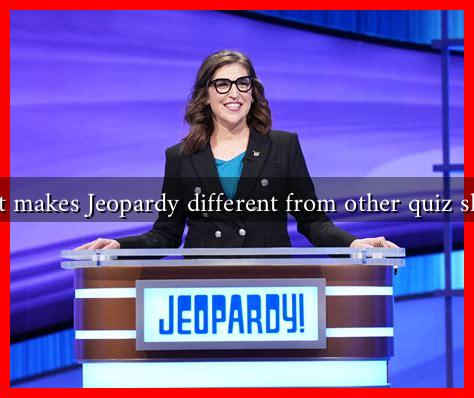-
Table of Contents
What Makes Jeopardy Different from Other Quiz Shows
Since its debut in 1964, “Jeopardy!” has become a cultural phenomenon, captivating audiences with its unique format and intellectual rigor. While many quiz shows entertain viewers with trivia and general knowledge, “Jeopardy!” stands apart for several compelling reasons. This article explores the distinctive features that set “Jeopardy!” apart from other quiz shows, examining its format, gameplay, and cultural impact.
The Unique Format of Jeopardy!
One of the most significant aspects that differentiates “Jeopardy!” from other quiz shows is its unique format. Unlike traditional quiz shows where contestants answer questions, “Jeopardy!” presents answers, and contestants must respond with the corresponding questions. This reversal of roles creates a distinctive challenge for players and engages viewers in a different way.
- Categories and Clues: Each episode features six categories, each containing five clues of increasing difficulty.
. This structure encourages contestants to strategize their gameplay, as they must decide which categories to pursue based on their strengths.
- Daily Doubles: The inclusion of Daily Doubles allows contestants to wager any amount of their current score on a single clue, adding an element of risk and strategy that is not commonly found in other quiz shows.
- Final Jeopardy: The Final Jeopardy round allows contestants to wager a portion of their earnings on a single clue, further emphasizing strategic thinking and risk management.
Intellectual Rigor and Depth of Knowledge
Another defining characteristic of “Jeopardy!” is its emphasis on intellectual rigor. Contestants are often required to possess a broad and deep knowledge base across various subjects, including history, literature, science, and pop culture. This requirement sets “Jeopardy!” apart from other quiz shows that may focus on more superficial or niche topics.
- Contestant Selection: The selection process for “Jeopardy!” contestants is rigorous, often involving a written test and an audition. This ensures that only the most knowledgeable and quick-thinking individuals make it to the stage.
- Challenging Clues: The clues presented on “Jeopardy!” often require not just factual recall but also critical thinking and the ability to make connections between different pieces of information.
Cultural Impact and Legacy
“Jeopardy!” has left an indelible mark on popular culture, influencing not only other quiz shows but also the broader entertainment landscape. Its iconic theme music, memorable catchphrases, and the image of its long-time host, Alex Trebek, have become ingrained in American culture.
- Influence on Other Shows: Many quiz shows have attempted to replicate the “Jeopardy!” format, but few have succeeded in capturing its essence. Shows like “Who Wants to Be a Millionaire?” and “The Chase” have their own unique formats but lack the intellectual depth and strategic gameplay that “Jeopardy!” offers.
- Educational Value: “Jeopardy!” has been praised for its educational value, often being used in classrooms to promote learning and critical thinking skills. The show’s format encourages viewers to engage with a wide range of topics, making it a valuable resource for knowledge acquisition.
Conclusion
In summary, “Jeopardy!” distinguishes itself from other quiz shows through its unique format, intellectual rigor, and significant cultural impact. The show’s innovative approach to trivia, combined with its emphasis on strategy and knowledge, has made it a beloved staple of American television. As it continues to evolve, “Jeopardy!” remains a testament to the power of knowledge and the joy of learning, ensuring its place in the hearts of fans for generations to come.
For more information about “Jeopardy!” and its history, you can visit the official website at Jeopardy.com.





